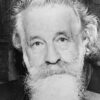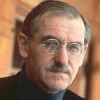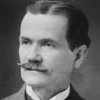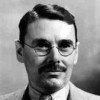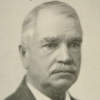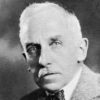The old folk of our grandfathers’ young days sang a song bearing exactly the same burden; and the young folk of to-day will drone out precisely similar nonsense for the aggravation of the next generation. “Oh, give me back the good old days of fifty years ago,” has been the cry ever since Adam’s fifty-first birthday. Take up the literature of 1835, and you will find the poets and novelists asking for the same impossible gift as did the German Minnesingers long before them and the old Norse Saga writers long before that. And for the same thing sighed the early prophets and the philosophers of ancient Greece. From all accounts, the world has been getting worse and worse ever since it was created. All I can say is that it must have been a remarkably delightful place when it was first opened to the public, for it is very pleasant even now if you only keep as much as possible in the sunshine and take the rain good-temperedly.
Jerome K. Jerome (1859-1927) English writer, humorist [Jerome Klapka Jerome]
Idle Thoughts of an Idle Fellow, “On Memory” (1886)
(Source)
First published in Home Chimes (1885-09-26).
Quotations about:
past
Note not all quotations have been tagged, so Search may find additional quotes on this topic.
It is this glamour of the past, I suppose, that makes old folk talk so much nonsense about the days when they were young. The world appears to have been a very superior sort of place then, and things were more like what they ought to be. Boys were boys then, and girls were very different. Also winters were something like winters, and summers not at all the wretched things we get put off with nowadays. As for the wonderful deeds people did in those times and the extraordinary events that happened, it takes three strong men to believe half of them.
Jerome K. Jerome (1859-1927) English writer, humorist [Jerome Klapka Jerome]
Idle Thoughts of an Idle Fellow, “On Memory” (1886)
(Source)
First published in Home Chimes (1885-09-26).
Yes, it is the brightness, not the darkness, that we see when we look back. The sunshine casts no shadows on the past. The road that we have traversed stretches very fair behind us. We see not the sharp stones. We dwell but on the roses by the wayside, and the strong briers that stung us are, to our distant eyes, but gentle tendrils waving in the wind. God be thanked that it is so — that the ever-lengthening chain of memory has only pleasant links, and that the bitterness and sorrow of to-day are smiled at on the morrow.
Jerome K. Jerome (1859-1927) English writer, humorist [Jerome Klapka Jerome]
Idle Thoughts of an Idle Fellow, “On Memory” (1886)
(Source)
First published in Home Chimes (1885-09-26).
Life altogether is but a crumbling ruin when we turn to look behind: a shattered column here, where a massive portal stood; the broken shaft of a window to mark my lady’s bower; and a moldering heap of blackened stones where the glowing flames once leaped, and over all the tinted lichen and the ivy clinging green.
Jerome K. Jerome (1859-1927) English writer, humorist [Jerome Klapka Jerome]
Idle Thoughts of an Idle Fellow, “On Memory” (1886)
(Source)
First published in Home Chimes (1885-09-26).
The mill cannot grind with the water that’s past.
George Herbert (1593-1633) Welsh priest, orator, poet.
Jacula Prudentum, or Outlandish Proverbs, Sentences, &c. (compiler), # 153 (1640 ed.)
(Source)
The Isles of Greece, the Isles of Greece!
Where burning Sappho loved and sung,
Where grew the arts of war and peace,
Where Delos rose, and Phoebus sprung!
Eternal summer gilds them yet,
But all, except their sun, is set.George Gordon, Lord Byron (1788-1824) English poet
Don Juan, Canto 3, st. 86a “The Isles of Greece,” st. 1 (1821)
(Source)
That is just the way with Memory; nothing that she brings to us is complete. She is a willful child; all her toys are broken. I remember tumbling into a huge dust-hole when a very small boy, but I have not the faintest recollection of ever getting out again; and if memory were all we had to trust to, I should be compelled to believe I was there still.
Jerome K. Jerome (1859-1927) English writer, humorist [Jerome Klapka Jerome]
Idle Thoughts of an Idle Fellow, “On Memory” (1886)
(Source)
First published in Home Chimes (1885-09-26).
The walls of books around me, dense with the past, formed a kind of insulation against the present world and its dangers. I hated to get up.
Ross Macdonald (1915-1983) American-Canadian author [pseud. of Kenneth Millar]
The Chill, ch. 8 (Lew Archer) (1963)
(Source)
Often misquoted in the third person ("The walls of books around him ...")
I want to visit Memory Lane, I don’t want to live there.
Letty Cottin Pogrebin (b. 1939) American author, journalist, lecturer, social activist
Deborah, Golda, and Me, ch. 1 (1991)
(Source)
The “good old times” — all times when old are good —
Are gone.
History is the only consolation left to the peoples, for it teaches them that their ancestors were as unhappy as themselves, or more unhappy.
[En effet, il ne reste guère, pour consoler les peuples, que de leur apprendre que leurs ancêtres ont été aussi malheureux, ou plus malheureux.]Nicolas Chamfort (1741-1794) French writer, epigrammist (b. Nicolas-Sébastien Roch)
Products of Perfected Civilization [Produits de la Civilisation Perfectionée], Part 1 “Maxims and Thoughts [Maximes et Pensées],” ch. 8, ¶ 474 (1795) [tr. Mathers (1926)]
(Source)
(Source (French)). Alternate translations:
In fact there is no longer any way of consoling the people except by teaching them that their forebears were as wretched as they are, or more so.
[tr. Merwin (1969)]
Indeed, if one is to console the peoples of the world there is little else one can do but teach them that their ancestors were just as wretched, or more so.
[tr. Pearson (1973)]
In effect, there is nearly no way to console peoples except to tell them that their ancestors were as unfortunate or more unfortunate than they are.
[tr. Siniscalchi (1994), ¶ 473]
Nearly all of history is only a string of horrors. If tyrants dismiss it while they are alive, it seems that their successors allow people to transmit to posterity the crimes of their predecessors, in order to offer diversion away from the horror that they inspire themselves.
[Presque toute l’Histoire n’est qu’une suite d’horreurs. Si les tyrans la détestent, tandis qu’ils vivent, il semble que leurs successeurs souffrent qu’on transmette à la postérité les crimes de leurs devanciers, pour faire diversion à l’horreur qu’ils inspirent eux-mêmes.]
Nicolas Chamfort (1741-1794) French writer, epigrammist (b. Nicolas-Sébastien Roch)
Products of Perfected Civilization [Produits de la Civilisation Perfectionée], Part 1 “Maxims and Thoughts [Maximes et Pensées],” ch. 8, ¶ 474 (1795) [tr. Siniscalchi (1994)]
(Source)
(Source (French)). Alternate translations:
Nearly all History is a procession of horrors; but, although tyrants hate History in their own lifetime, a general transmission of such crimes is not unpleasing to their descendants, for it distracts attention from their own.
[tr. Mathers (1926)]
Almost the whole of history is nothing but a series of horrors. If tyrants detest it while they are alive, their successors seem willing to allow the crimes of their predecessors to be transmitted to posterity, to divert attention from the horror that they themselves inspire.
[tr. Merwin (1969)]
Almost the whole of history is nothing more than a series of horrors. If tyrants detest it while they are alive, it seems that their that their successors suffer that the crimes of their predecessors should be laid at the door of posterity, in order to divert attention from the horrors to which they themselves give rise.
[tr. Pearson (1973)]
Almost all of history is a story of horror. If tyrants condemn it during their lifetime, their successors seem to allow the crimes of their predecessors to be passed on to posterity, thereby diverting attention from the horror they themselves inspire.
[tr. Parmée (2003)]
Scars have the strange power to remind us that our past is real. The events that cause them can never be forgotten, can they?
Cormac McCarthy (1933-2023) American novelist, playwright, screenwriter
All the Pretty Horses (1992)
(Source)
All that [experience] really demonstrated was that our future would be the same as our past, and that the sin we had done once, and with loathing, we would do many times, and with joy.
Oscar Wilde (1854-1900) Irish poet, wit, dramatist
The Picture of Dorian Gray, ch. 4 (1891)
(Source)
The passage also occurs in ch. 3 of the original Lippincott's Monthly Magazine (1890-06) version.
As extracted into Oscariana and epigram form (e.g.), it is given in the present tense:
All that it really demonstrates is that our future will be the same as our past, and that the sin we have done once, and with loathing, we shall do many times, and with joy.
You think when you wake up in the mornin yesterday dont count. But yesterday is all that does count. What else is there? Your life is made out of the days it’s made out of. Nothin else. You might think you could run away and change your name and I dont know what all. Start over. And then one mornin you wake up and look at the ceilin and guess who’s layin there?
Cormac McCarthy (1933-2023) American novelist, playwright, screenwriter
No Country for Old Men (2005)
(Source)
It’s not about knowin where you are. It’s about thinkin you got there without takin anything with you. Your notions about startin over. Or anybody’s. You dont start over. That’s what it’s about. Every step you take is forever. You cant make it go away. None of it.
Cormac McCarthy (1933-2023) American novelist, playwright, screenwriter
No Country for Old Men (2005)
(Source)
Economists are surgeons who have an excellent scalpel but a jagged lancet — they operate exquisitely on the dead but torture the living.
[Les économistes sont des chirugiens qui on un excellent scalpel et un bistouri ébréché, opérant à merveille sur le mort et martyrisant le vif.]
Nicolas Chamfort (1741-1794) French writer, epigrammist (b. Nicolas-Sébastien Roch)
Products of Perfected Civilization [Produits de la Civilisation Perfectionée], Part 1 “Maxims and Thoughts [Maximes et Pensées],” ch. 7, ¶ 457 (1795) [tr. Dusinberre (1992)]
(Source)
(Source (French)). Alternate translations:
Political Economists are surgeons with excellent scalpels and blunted bistouries; they work on the dead to a marvel and torture the living.
[tr. Mathers (1926)]
An economist is a surgeon with an excellent scalpel and a rough-edged lancet, who operates beautifully on the dead and tortures the living.
[tr. Merwin (1969)]
Economists are surgeons who wield an excellent scalpel and a chipped bistoury, and operate wonderfully on the dead flesh and agonize the living.
[tr. Pearson (1973)]
Economists are surgeons who have an excellent scalpel and chipped scissors, who operate marvelously on the dead and who make martyrs of the living.
[tr. Siniscalchi (1994)]
Books are embalmed minds; they make the great of other days our present teachers. Through books we look, as through “a glass darkly,” upon those vast multitudes whose bodies have passed to dust, and form the earth we tread upon, and through them we, in our turn, shall be made known to coming time.
Christian Nestell Bovee (1820-1904) American epigrammatist, writer, publisher
Intuitions and Summaries of Thought, Vol. 1, “Books” (1862)
(Source)
Childhood is a thing that happens so early you don’t forget it. Everything else you grow out of, but you never recover from childhood.
Beryl Bainbridge (1932-2010) English novelist
“Beryl Bainbridge and Her Tenth Novel,” interview by Willa Petschek, New York Times (1981-03-01)
(Source)
So, like a forgotten fire, a childhood can always flare up again within us.
Gaston Bachelard (1884-1962) French philosopher.
The Poetics of Reverie, ch. 3 “Reveries Toward Childhood,” sec. 2 (1969)
(Source)
When you’re forty, half of you belongs to the past — and when you’re seventy, nearly all of you —
Jean Anouilh (1910-1987) French dramatist
Léocadia [Time Remembered], Act 2, sc. 2 [Duchess] (1939) [tr. Moyes (1955)]
(Source)
So gleams the past, the light of other days,
Which shines, but warms not with its powerless rays.George Gordon, Lord Byron (1788-1824) English poet
“Sun of the Sleepless!” Hebrew Melodies (1815)
(Source)
Those were great old days, (but darn it any old days are great old days. Even the tough ones, after they are over, you can look back with great memories.)
I conceive that there is nothing which gives a man more pause before taking as absolute what his feelings welcome, and his mind deems plausible, than even the flicker of recollection that something of the sort has been tried before, felt before, disputed before, and for some reason or other has now quite gone into Limbo.
Learned Hand (1872-1961) American jurist
“Sources of Tolerance,” speech, University of Pennsylvania Law School (1930-06)
(Source)
Write it on your heart that every day is the best day in the year. He is rich who owns the day, and no one owns the day who allows it to be invaded with fret and anxiety. Finish every day and be done with it. You have done what you could. Some blunders and absurdities, no doubt crept in. Forget them as soon as you can, tomorrow is a new day; begin it well and serenely, with too high a spirit to be cumbered with your old nonsense. This new day is too dear, with its hopes and invitations, to waste a moment on the yesterdays.
Ralph Waldo Emerson (1803-1882) American essayist, lecturer, poet
(Spurious)
This widely spread inspirational quotation is actually a piecing-together of multiple phrases from different sources, some not even Emerson. It includes bits from his essay "Works and Days" (here and here), observations on Emerson by Lillian Whiting, and fragments from a letter by him to his daughter Ellen.
The result sounds much like Emerson, but would require more ellipses than text to qualify as a quotation of him. It would be a great candidate for an AI "quotation" except that references to it can be found back in the 2010s, so it is almost certainly of human origin.
More detailed discussion: poetry - From which book or essay are these words by Ralph Waldo Emerson? "Write it on your heart that every day is the best day in the year..." - Literature Stack Exchange.
The past is never dead. It’s not even past.
William Faulkner (1897-1962) American novelist
Requiem for a Nun, Act 1, sc. 3 [Stevens] (1951)
(Source)
Sometimes misquoted as "The past isn't over. It isn't even past."
Try as we will, we cannot honestly recall our youth, for we have lost the feel of its main ingredient: suspense.
Mignon McLaughlin (1913-1983) American journalist and author
The Neurotic’s Notebook, ch. 3 (1963)
(Source)
Memory is a crazy woman that hoards colored rags and throws away food.
Austin O'Malley (1858-1932) American ophthalmologist, professor of literature, aphorist
Keystones of Thought (1914)
(Source)
Drop the last year into the silent limbo of the past. Let it go, for it was imperfect, and thank God that it can go.
Brooks Atkinson (1894-1984) American drama critic and journalist
Once Around the Sun, “December 31” (1951)
(Source)
Sweet is the remembrance of troubles when you are in safety.
Euripides (485?-406? BC) Greek tragic dramatist
Andromeda [Ἀνδρομέδα], Frag. 131 (TGF) (412 BC)
(Source)
(Source (Greek)). Alternate translations:
'Tis sweet to recollect past toils in safety.
[tr. Wodhull (1809)]
Sweet is the memory of toils that are past.
[tr. Reid (1883), in Cicero, De Finibus, 2.105]
Sweet is the memory of sorrows past.
[tr. Rackham (1914), in Cicero, De Finibus, 2.105]
Persons of today praise the things of yesterday, and those here the things there. Everything past seems best and everything distant is more valued.
[También alaban los de hoy las cosas de ayer, y los de acá las de allende. Todo lo pasado parece mejor, y todo lo distante es más estimado.]
Baltasar Gracián y Morales (1601-1658) Spanish Jesuit priest, writer, philosopher
The Art of Worldly Wisdom [Oráculo Manual y Arte de Prudencia], § 209 (1647) [tr. Jacobs (1892)]
(Source)
(Source (Spanish)). Alternate translations:
Modern men praise ancient things, and those that are here, things that are there. All that's past seems best, and all that's remote is most esteemed.
[Flesher ed. (1685)]
People of today praise things of yesterday, and those who are here, the things that are there. The past seems better, and everything distant is held more dear.
[tr. Maurer (1992)]
They of today glorify only things of yesterday, and those from here only the things from afar. Or that all that is past is better, and everything that is distant, more valuable.
[tr. Fischer (1937)]
We should not forget that our tradition is one of protest and revolt, and it is stultifying to celebrate the rebels of the past — Jefferson and Paine, Emerson and Thoreau — while we silence the rebels of the present.
Count heads. That is what matters in all things. When you must, follow the common taste, and make your way toward eminence. The wise should adapt themselves to the present, even when the past seems more attractive, both in the clothes of the soul and of the body. This rule for living holds for everything but goodness, for one must always practice virtue.
[El gusto de las cabeças haze voto en cada orden de cosas. Ésse se ha de seguir por entonces, y adelantar a eminencia. Acomódese el cuerdo a lo presente, aunque le parezca mejor lo pasado, así en los arreos del alma como del cuerpo. Sólo en la bondad no vale esta regla de vivir, que siempre se ha de practicar la virtud.]
Baltasar Gracián y Morales (1601-1658) Spanish Jesuit priest, writer, philosopher
The Art of Worldly Wisdom [Oráculo Manual y Arte de Prudencia], § 120 (1647) [tr. Maurer (1992)]
(Source)
(Source (Spanish)). Alternate translations:
Let a prudent man accommodate himself to the present, whether as to body, or mind, though the past may even seem better unto him. In manners onely that rule is not to be observed, seeing vertue is at all times to be practised.
[Flesher ed. (1685)]
In everything the taste of the many carries the votes; for the time being one must follow it in the hope of leading it to higher things. In the adornment of the body as of the mind adapt yourself to the present, even though the past appear better. But this rule does not apply to kindness, for goodness is for all time.
[tr. Jacobs (1892)]
The choice of the many carries the vote in every field. For the time being, therefore, it must be bowed to, in order to bring it to higher level: the man of wisdom accommodates himself to the present, even though the past seems better, alike in the dress of his spirit, as in the dress of his body. Only in the matter of being decent does this rule of life not apply, for virtue should be practiced eternally.
[tr. Fischer (1937)]
Dear Ald,
Been an odd day … It’s all quite incredible — not that twenty years have gone by nor even that I survived … it is just to walk over the same ground after so much has happened and to remember it all with such infinite clarity.
Last week, I went back to a little village outside of Manila called Paranaque. My last visit there was February 4, 1945, and I spent one day and one night getting shelled. So I took the nostalgic walk one early morning and drank it all in and began to feel sad because nobody came up to me as they did twenty years ago and grin and say, “Victory, Joe!” So three hours later I went through a tiny alley and wound up on a dirty beach overlooking the ocean, and this little grimy 8-year-old kid comes up to me and says, “What are you looking for, Joe?” And I cup this dirty little brown face in my hand and I answer, “My youth, Joe.”
Hey, Ald! You can’t go back. At least you can’t go back and experience. You return as a tourist just to observe. Like visiting a cemetery. Nobody’s around to talk to you and reminisce, even though deep in your gut you have this urge to tap some ghost on a shoulder and say, “Hey, buddy, remember that afternoon ….”
The strategic aim of these hierarchical constructions of history is to displace truth, and the invention of a glorious past includes the erasure of inconvenient realities.
Jason Stanley (b. 1969) American philosopher, epistemologist, academic
How Fascism Works: The Politics of Us and Them, ch. 1 (2018)
(Source)
There are two cinemas: the films we have actually seen and the memories we have of them. The gap between the two widens over the years.
Molly Haskell (b. 1939) American feminist film critic and author.
From Reverence to Rape: The Treatment of Women in the Movies (3rd ed, 2016; orig 1973)
(Source)
Men will learn eventually, and if they insist on rejecting the received wisdom of generations past, they do not thereby succeed at invalidating it; they merely condemn themselves to learning it, time and again, by ever grimmer experience.
Hilaire Belloc (1870-1953) Franco-British writer, historian [Joseph Hilaire Pierre René Belloc]
(Misattributed)
(Source)
While usually attributed to Belloc, and even further to his essay "The Restoration of Property" (1936), it does not appear in that work, proper. Rather, it is found in the Introduction to the 2002 IHS Press edition the work, signed only by the Directors of the IHS Press.
The past exudes legend: one can’t make pure clay of time’s mud. There is no life that can be recaptured wholly; as it was. Which is to say that all biography is ultimately fiction.
In the middle of the night, things well up from the past that are not always cause for rejoicing — the unsolved, the painful encounters, the mistakes, the reasons for shame or woe. But all, good or bad, give me food for thought, food to grow on.
May Sarton (1912-1995) Belgian-American poet, novelist, memoirist [pen name of Eleanore Marie Sarton]
At Seventy (1984)
(Source)
The past, which as always did not know the future, acted in ways that ask to be imagined before they are condemned. Or even simplified.
I can tell you that solitude
Is not all exaltation, inner space
Where the soul breathes and work can be done.
Solitude exposes the nerve,
Raises up ghosts.
The past, never at rest, flows through it.May Sarton (1912-1995) Belgian-American poet, novelist, memoirist [pen name of Eleanore Marie Sarton]
“Gestalt at Sixty,” sec. 1 (1972)
(Source)
We two will keep to the shelter here, eat and drink
and take some joy in each other’s heartbreaking sorrows,
sharing each other’s memories. Over the years, you know,
a man finds solace even in old sorrows, true, a man
who’s weathered many blows and wandered many miles.[νῶϊ δ᾽ ἐνὶ κλισίῃ πίνοντέ τε δαινυμένω τε
κήδεσιν ἀλλήλων τερπώμεθα λευγαλέοισι,
400μνωομένω: μετὰ γάρ τε καὶ ἄλγεσι τέρπεται ἀνήρ,
ὅς τις δὴ μάλα πολλὰ πάθῃ καὶ πόλλ᾽ ἐπαληθῇ.]Homer (fl. 7th-8th C. BC) Greek author
The Odyssey [Ὀδύσσεια], Book 15, l. 397ff (15.397) [Eumæus] (c. 700 BC) [tr. Fagles (1996)]
(Source)
(Source (Greek)). Alternate translations:
We two, still in our tabernacle here
Drinking and eating, will our bosoms cheer
With memories and tales of our annoys.
Betwixt his sorrows ev’ry human joys,
He most, who most hath felt and furthest err’d.
[tr. Chapman (1616)]
Meanwhile let us sit here, and drink and chat,
And stories of our sad adventures tell;
For much contentment there is ev’n in that,
To them that suffer’d have and come off well.
[tr. Hobbes (1675), l. 357ff]
Here let us feast, and to the feast be joined
Discourse, the sweeter banquet of the mind;
Review the series of our lives, and taste
The melancholy joy of evils passed:
For he who much has suffered, much will know,
And pleased remembrance builds delight on woe.
[tr. Pope (1725)]
But we with wine and a well-furnish’d board
Supplied, will solace mutually derive
From recollection of our sufferings past;
For who hath much endured, and wander’d far,
Finds the recital ev’n of sorrow sweet.
[tr. Cowper (1792), l. 483ff]
But we two, drinking wine and eating bread,
Will charm our dear hearts each with other's pain.
Past sorrow, and the tears a man hath shed,
Who far hath wandered over earth and main,
Yield comfort.
[tr. Worsley (1861), st. 55]
Let us, meanwhile,
Within this hut potations free enjoy,
And to our full contentment eat, while each
The mem'ry wakens of his own past griefs;
For, let but time enough elapse, the man
Who has sharp trials brook'd, and through the world
A wand'rer rov'd, will on his by-gone woe
Exulting dwell.
[tr. Musgrave (1869), l. 651ff]
We two in the hut a' drinking and a' feasting,
We'll soothe each other with our doleful cares
Recounting them! for even sorrows bring
An after pleasure to the wight, I ween, --
His many woes and many wandrings past.
[tr. Bigge-Wither (1869)]
But let us twain drink and feast within the steading, and each in his neighbour’s sorrows take delight, recalling them, for even the memory of griefs is a joy to a man who hath been sore tried and wandered far.
[tr. Butcher/Lang (1879)]
But here in the booth we twain at the drink and the banqueting
Shall be merry with the memory of each other's weary woe.
For very grief shall gladden the man that to and fro
Hath wandered wide the world, and suffered sorrow sore.
[tr. Morris (1887)]
But let us drink and feast within the lodge, and please ourselves with telling one another tales of piteous ill; for afterwards a man finds pleasure in his pains, when he has suffered logn and wandered long.
[tr. Palmer (1891)]
We too will sit here eating and drinking in the hut, and telling one another stories about our misfortunes; for when a man has suffered much, and been buffeted about in the world, he takes pleasure in recalling the memory of sorrows that have long gone by.
[tr. Butler (1898)]
But we two will drink and feast in the hut, and will take delight each in the other's grievous woes, as we recall them to mind. For in after time a man finds joy even in woes, whosoever has suffered much, and wandered much.
[tr. Murray (1919)]
But we two snugly indoors here may drink and eat and revel in an interchange of sorrows-- sorrows that are memories, I mean; for when a man has endured deeply and strayed far from home he can cull solace from the rehearsal of old griefs.
[tr. Lawrence (1932)]
Meanwhile let us two, here in the hut, over our food and wine, regale ourselves with the unhappy memories that each can recall. For a man who has been through bitter experiences and travelled far can enjoy even his sufferings after a time.
[tr. Rieu (1946)]
Here's a tight roof; we'll drink on, you and I, and ease our hearts of hardships we remember, sharing old times. In later days a man can find a charm in old adversity, exile and pain.
[tr. Fitzgerald (1961)]
But we two, sitting here in the shelter, eating and drinking,
shall entertain each other remembering and retelling
our sad sorrows. For afterwards a man who has suffered
much and wandered much has pleasure out of his sorrows.
[tr. Lattimore (1965)]
Meanwhile let us two have the satisfaction of sharing our unhappy memories over our food and wine here in the hut. For a man who has been through bitter experiences and travelled far enjoys even his sufferings after a time.
[tr. DCH Rieu (2002)]
We two will have our food and drink here in the hut and find pleasure in each other's sad troubles, as we call them to mind; for it is man's way to get enjoyment even from affliction, after the event, if he is a man who has suffered much and roamed far.
[tr. Verity (2016)]
Now let us dine and drink in my home
And take pleasure while we recall to one another
Our grievous pains. For a man may take pleasure even in pain,
Later, when he has suffered and come through so many things.
[tr. @sentantiq (2016)]
But let us, you and I, sit in my cottage over food and wine, and take some joy in hearing how much pain we each have suffered. After many years of agony and absence from one's home, a person can begin enjoying grief.
[tr. Wilson (2017)]
But we two will drink and feast in the hut, and enjoy hearing about each other's wretched misfortunes as we recall them. A man looking back can find pleasure even in grief, one who's suffered and wandered much.
[tr. Green (2018)]
But we two will drink and enjoy each other's sad stories.
[tr. Green (2018), summary version]
We two will drink and feast here in the hut
and enjoy each other’s wretched troubles,
as we recall them. For once they’re over,
a man who’s done a lot of wandering
and suffered much gets pleasure from his woes.
[tr. Johnston (2019), l. 509ff]
As we two drink and dine in this shelter
Let us take pleasure as we recall one another’s terrible pains.
For a man finds pleasure even in pains later on
After he has suffered so very many and survived many too.
[tr. @sentantiq [Joel] (2019)]
Let us take pleasure in calling to mind each other’s terrible pains
while we drink and dine in my home.
For someone may even find pleasure among pains
when they have suffered many and gone through much.
[tr. @sentantiq (2020)]
At odd and unpredictable times, we cling in fright to the past.
Isaac Asimov (1920-1992) Russian-American author, polymath, biochemist
Foundation’s Edge, Part 1, ch. 1 (1982)
(Source)
The past is the only dead thing that smells sweet.
Edward Thomas (1878-1917) British poet, essayist, novelist
“Early One Morning,” Poems (1917)
(Source)
Sometimes misattributed to Cyril Connolly.
The present enables us to understand the past, not the other way round.
A. J. P. Taylor (1906-1990) British historian, journalist, broadcaster [Alan John Percivale Taylor]
“The Radical Tradition: Fox, Paine, and Cobbett,” The Trouble Makers: Dissent over Foreign Policy, 1792-1939 (1969)
(Source)
That’s what history is. It’s a conversation between the past and the present.
Lewis H. Lapham (b. 1935) American writer and editor
“The Art of Editing No. 4,” The Paris Review (Summer 2019)
(Source)
Nobody knows what is going to happen because so much depends on an enormous number of variables, on simple hazard. On the other hand if you look at history retrospectively, then, even though it was contingent, you can tell a story that makes sense. … Jewish history, for example, in fact had its ups and downs, its, enmities and its friendships, as every history of all people has. The notion that there is one unilinear history is of course false. But if you look at it after the experience of Auschwitz it looks as though all of history — or at least history since the Middle Ages — had no other aim than Auschwitz. … This, is the real problem of every philosophy of history how: is it possible that in retrospect it always looks as though it couldn’t have happened otherwise?
Hannah Arendt (1906-1975) German-American philosopher, political theorist
Interview with Roger Errera (Oct 1973), The New York Review of Books (26 Oct 1978)
(Source)
A dogma is the hand of the dead on the throat of the living.
Lemuel K. Washburn (1846-1927) American freethinker, writer
Is the Bible Worth Reading and Other Essays (1911)
(Source)
“Miracles do not happen:” –‘t is plain sense,
If you italicize the present tense;
But in those days, as rare old Chaucer tells,
All Britain was fulfilled of miracles.
So, as I said, the great doors opened wide.
In rushed a blast of winter from outside,
And with it, galloping on the empty air,
A great green giant on a great green mare.Charlton Miner Lewis (1866-1923) American scholar of English literature, author
Gawayne and the Green Knight, Canto 1 (1903)
(Source)
To be unacquainted with what has passed in the world, before we came into it ourselves, is to be always children. For what is the age of a single mortal, unless it is connected, by the aid of History, with the times of our ancestors?
[Nescire autem quid ante quam natus sis acciderit, id est semper esse puerum. Quid enim est aetas hominis, nisi ea memoria rerum veterum cum superiorum aetate contexitur?]
Marcus Tullius Cicero (106-43 BC) Roman orator, statesman, philosopher
Brutus, ch. 34, sec. 120 (55 BC) [tr. Jones (1776)]
(Source)
The original Latin. Alt. trans.
- "For not to know what happened before one was born, is to be a boy all one s life. For what is the life of a man unless by a recollection of bygone transactions it is united to the times of his predecessors?" [tr. Yonge (1853)]
- "To be ignorant of what happened before you were born is to remain always a boy. For what is the lifetime of a man, unless it is connected with the lifetime of older men by the memory of earlier events?" [tr. Fox (2007)]
- "What is a generation, if it is not conjoined with the age of our predecessors by the memory of ancient things?" [tr. @sentantiq]
- "Not to know what happened before you were born is to be a child forever. For what is the time of a man, except it be interwoven with that memory of ancient things of a superior age?"
- "Not to know what happened before you were born is always to be a boy."
- "To be ignorant of the past is to be forever a child."
It is impossible to divide the past into distinct, clearly defined periods and prove that one age ended and another began in a particular year, such as 476, or 1453, or 1789. Men do not and cannot change their habits and ways of doing things all at once, no matter what happens.
James Harvey Robinson (1863-1936) American historian and educator
An Introduction to the History of Western Europe, ch. 1 “The Historical Point of View” (1902)
(Source)
One would expect people to remember the past and to imagine the future. But in fact, when discoursing or writing about history, they imagine it in terms of their own experience, and when trying to gauge the future they cite supposed analogies from the past: till, by a double process of repetition, they imagine the past and remember the future.
Ghosts seem harder to please than we are; it is as though they haunted for haunting’s sake — much as we relive, brood, and smoulder over our pasts.
Elizabeth Bowen (1899-1973) Irish author
The Second Ghost Book, Preface (1952) [ed. C. Asquith]
(Source)











